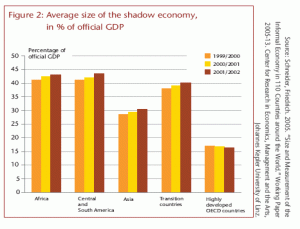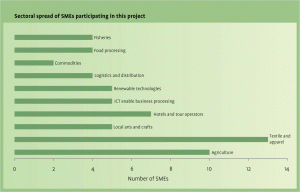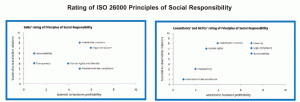It is estimated that up to 97 percent of the world’s businesses are SMEs. International standards thus need to provide as many benefits for small businesses as they do for global enterprises.
The time is right to implement the ISO 26000 standard, Guidance on Social Responsibility, according to the International Institute for Sustainable Development (IISD).
The IISD has carried out a global assessment (http://www.iisd.org publications/pub.aspx?pno=1009) of its relevancy to small to medium-sized enterprises (SMEs). It mapped the materiality of the ISO 26000 Social Responsibility to SMEs through a global survey of 59 SMEs, 37 social responsibility consultations and 16 National Cleaner Production Centres across the world.
While IISD, like a number of other stakeholders, believes the standard has many shortcomings, it recognizes too that ISO 26000 has been in development for over five years and that more years of debate are difficult to justify. Postponing its launch would be a case of ‘too little too late’.
IISD is confident the standard presents a toughly negotiated position on how social responsibility could be interpreted and applied worldwide. It is also consistent with ISO’s objective of developing standards that are practical tools for achieving a sustainable world.
ISO 26000: A Broad Reference Document
IISD’s survey conclusions cannot be regarded as definitive, as it was based on an early working draft of the standard, which has since evolved through several more drafts. However, the survey has the merit of bringing to light the preoccupations of SMEs with regard to social responsibility.
The study concludes that driven by the global and prestigious brand value attached to ISO standards, SMEs will look to ISO 26000 as a broad reference document which provides a comprehensive definition of social responsibility and a detailed description of all its contents.
The draft standard represents an international consensus on how social responsibility, a concept that has been hotly debated for over 20 years, might be interpreted and applied across organizations of all types in both public and private sectors. It marks an important step in what has been one of the biggest, formal, multi-stakeholder processes in the history of standardization, bringing together over 500 individuals from 91 countries.
Remembering the Global Economy’s Backbone
The ISO 26000 process and the product have not been without critics. There are some who consider the sustainable development process to be beyond the reach of SMEs, who form the backbone of the global economy. SMEs are perceived as un-engaged stakeholders in the quest for social, financial and environmental equity.
Given their small size and lower profile in the market, SMEs tend to escape both the scrutiny of watchdogs and the assistance of governments and donors. But they are the first to be affected by the dynamics of globalization, including the prevailing economic downturn and ensuing fall in consumption.
For example, the credit crisis has severely affected credit flows to SMEs who are heavily dependent on bank credit and have limited recourse to financial markets. This is of grave concern to the entire global community as SMEs account for between 40 to 60 percent of global GDP and up to 70 percent of employment in member countries of the OECD – even higher percentages in non-OECD countries.
Even as confidence may be restoring in the financial markets and government stimulus spending begins to trickle into major supply chains, resources aimed directly at helping small firms weather the downturn remain few and far between.
Governments and the financial sector must heed small businesses’ call for improved access to finance. If SMEs are to take on environment and social improvements, they will require concerted support in terms of credit and consultancy. They will also require external expertise to interpret and implement ISO 26000 in a manner that is best suited to their business context. This inherently implies additional costs that small organizations may find difficult to justify.
As speculation mounts on how ISO 26000 will play out across global markets, we also need to be aware that while it may raise the bar on the level and scope of work that is defined as social responsibility, it can also create immediate term difficulties for SMEs who will lack the financial resources and expertise in the short term to follow its guidance.
Finally, dare we suggest that it is not standards, incentives, or any other voluntary market policy that will drive social responsibility in SMES, but the personal values of the owner. ISO 26000, as a guidance standard, could well appeal to enlightened entrepreneurs, propelling renewed growth with far less discontent.
ISO 26000 and Beyond
ISO 26000 is an extremely ambitious project, not only in terms of the working group size, but also considering the wide range of issues that fall under the banner of social responsibility. Ranging from human rights and decent work conditions to consumer protection, these are aspects on which the global debate remains tense and even polarized.
IISD’s study establishes that ISO 26000 may increase awareness, provide definitions and add legitimacy to the social responsibility debate. Another dimension that supports this perspective is that SMEs and their stakeholders tend to view standards as valuable starter tools for introducing firms to the concept of sustainable development and possibly help them determine the best places to initiate action.
Still, SMEs have little interest in following codes of conduct, writing corporate sustainability reports, tracking performance indicators and paying for evaluation audits.
As ISO 26000 is being designed as a global guidance document, this might not come as a big surprise. ISO 26000 is also a global standard for all types of organization-public sector and governmental, as well as big business and SMEs.
It is therefore impractical to expect a global document to have equal applicability across diverse sectors and geographies. It is also important to note that as ISO 26000 was developed through a very large, global, multi-stakeholder process, it reflects the generic middle ground where different stakeholder groups “agreed to disagree”.
Our challenge is to find methods to implement the improvements offered by the standard, that are different from the more formal ones used by multi-national companies.
Finally, dare we suggest that it is not standards, incentives, or any other voluntary market policy that will drive social responsibility in SMES, but the personal values of the owner.
SMEs have little interest in following codes of conduct, writing corporate sustainability reports, tracking performance indicators and paying for evaluation audits.
ISO 26000, as a guidance standard, could well appeal to enlightened entrepreneurs, propelling renewed growth with far less discontent.
The International Institute for Sustainable Development contributes to sustainable development by advancing policy recommendations on international trade and investment, economic policy, climate change and energy, measurement and assessment, and sustainable natural resources management.









Amiable dispatch and this mail helped me alot in my college assignement. Thanks you seeking your information.